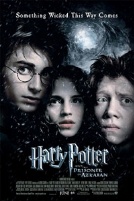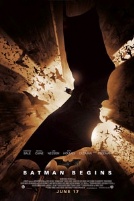 It takes a big man, or woman, to suck it up and admit their mistakes. But sometimes it really pays off. After a franchise has shot itself in the foot with a crappy installment, ridiculous casting decision, or absurd plot twist, sometimes the only thing you can do is apologize to your viewer. After the debacle of Transformers: Revenge of the Fallen, which received an abysmal 20% Fresh on RottenTomatoes, director Michael Bay has apologized and promised that the next Transformers film will be a (relative) return to form. And judging from early reviews, it may well be. In honor of Transformers: Dark of the Moon, we’ll take a look at other franchises that were able to pull out of nosedives by making it up to their fans.
It takes a big man, or woman, to suck it up and admit their mistakes. But sometimes it really pays off. After a franchise has shot itself in the foot with a crappy installment, ridiculous casting decision, or absurd plot twist, sometimes the only thing you can do is apologize to your viewer. After the debacle of Transformers: Revenge of the Fallen, which received an abysmal 20% Fresh on RottenTomatoes, director Michael Bay has apologized and promised that the next Transformers film will be a (relative) return to form. And judging from early reviews, it may well be. In honor of Transformers: Dark of the Moon, we’ll take a look at other franchises that were able to pull out of nosedives by making it up to their fans.
 Ocean’s Thirteen
Ocean’s Thirteen
Ocean’s Thirteen is the textbook example of an apology film. The first Ocean’s film was wildly successful, but the second was, to be blunt, terrible. So terrible, in fact, that it won a place on Entertainment Weekly’s list of 25 Worst Sequels Ever Made, alongside such esteemed company as Jaws: The Revenge and Leprechaun: Back 2 the Hood. The only purpose of Ocean’s Twelve is to serve as a reminder to the generations that follow us about the peril of using “wacky” breakdancing as a plot point in film. With the third installment, however, Steven Soderbergh brought the Rube Goldberg-esque heist antics that made the original a hit, and stopped with the weird meta references to Julia Roberts’ character looking like Julia Roberts.
The cast and crew of Ocean’s Thirteen were quite open about their film’s status as an apology. In an interview, Matt Damon joked that “the tagline we’re really trying to get them to use is ‘Ocean’s Thirteen: The film they should have made last time’!”And while Thirteen didn’t make quite as much money as the films that proceeded it, it did manage to get people back into theaters for a third time.
 Star Trek
Star Trek
If there’s a franchise that’s the king of the “apology sequel”, it’s Star Trek. So much so, in fact, that it’s easy to estimate a Trek film’s quality simply by looking at the number at the end: if it’s even, you’re okay. If it’s odd, God help you. The original Star Trek: The Motion Picture is no classic, it did fairly well in theaters, but was clumsy and dull. And for fans who had waited ten years for a continuation of the series, it was hugely disappointing. It wasn’t until the second film, Star Trek: the Wrath of Khan, that the franchise began to take off and fans got the fun, thrilling adventure they were hoping for. (And the return of one of the best villains of film, the infamous KHAAAAAAAAN. Whose name must always be spelled like that.)
The cycle of apology sequels continued for years- after the overly serious third film, the fourth was lighthearted and funny. The fifth film was downright ridiculous, but the sixth brought the franchise back to its roots. Where the seventh over-relied on the reappearance of Kirk, the eighth let the Next Generation cast stand on its own. And after the lackluster ninth and the unmitigated disaster of the tenth film, JJ Abrams gave the series a fresh start with the action-packed new Star Trek. On the one hand, you have to congratulate Trek on getting a sustainable formula down, it’s not every series that gets eleven installments. On the other, is it so hard to make two good movies in a row?
 X-Men
X-Men
X-Men has proven a surprisingly durable superhero franchise, with five films within the same continuity released since 2000. While this is impressive for any franchise, it’s especially impressive in light of how terrible two of those films were. X-Men Origins: Wolverine managed to make one of the coolest characters in the series look like a boring tool, and you shouldn’t even get me started on X-Men: The Last Stand. Were I to get started, however, it would look a lot like this: they killed of Cyclops off-screen! And didn’t bring it up for half the film! What is Brett Ratner doing?!
While X-Men: First Class was by no means a perfect film, (killing off the black mutant first? Really?) it was a great apology effort on the behalf of the studio. The film focused on two of the most beloved characters, Charles Xavier and Magneto, who had been somewhat sidelined in the prior ensemble films. On a creative level, it brought back Bryan Singer, director of the first two X-Men films, as an executive producer; and give the project to Matthew Vaughn, one of the original perspective directors for The Last Stand, to direct. These smart moves on the part of the studio may have saved a franchise that I was ready to write off.
 James Bond
James Bond
Like Star Trek, James Bond is another series that’s built on the “apology sequel.” It even has an apology mechanic built in: once one Bond starts to show his age, you can just cast another one. This method helped keep the franchise strong for years, as each new Bond addressed the weaknesses of his predecessors and adapted to audience tastes. Except for George Lazenby.
While there are many Bond apology films, Casino Royale is probably the most drastic example. By the early 2000’s, the Bond franchise’s very future was in doubt- the superspy was seeming more and more irrelevant in a post-Cold War world. Die Another Day did little to redeem the franchise, highlighting gadgets, product placement, and empty fight scenes. While the casting of Daniel Craig didn’t initially win over fans, the series’ toned-down and realistic new take returned the series to relevance. I hate to use the term “darker and grittier”, but sometimes it works out for the best.
 The Incredible Hulk
The Incredible Hulk
While The Incredible Hulk may technically be a reboot of Ang Lee’s Hulk rather than a sequel, there’s no doubt that it was created in response to the earlier film. And that response is “Oh dear God, we are so so sorry.” Ang Lee’s film was a unique, philosophical take on the Hulk, and was a more internal, personal take on the superhero genre. It was also incredibly slow, misguided, and difficult to watch. With The Incredible Hulk, Marvel Studios reset the tone of the series and brought the character back in line with their brand image- ready for summer explosions over deep philosophical discussions about the nature of mankind. And thank Thor for that.
 Harry Potter
Harry Potter
It’s easy to forget, now that the Harry Potter series is about to debut its final film, that the series got off to a bumpy start. The first two films weren’t terrible, certainly, but they weren’t especially good either. Chris Columbus seemed intent on creating the most generic kids entertainment possible, translating the events of the book to the screen faithfully but capturing little of the magic (see what I did there?) that made the series a hit. The warm glow of nostalgia has helped to make the films somewhat more appealing, but try to watch them without something like Brad Neely’s hilarious Wizard People, Dear Reader commentary track and see how far you get.
That all changed with Alfonso Cuaron’s take on the third film in the series, Harry Potter and the Prisoner of Azkaban. Cuaron was the first director to approach the world with a sense of creative enthusiasm, bringing something new to the world rather than transcribing it in a different medium. Some of these creative choices were suspect (what’s with the shrunken head?) they indicated an impressive apology on the part of Warner Brothers. Everyone involved with the series knew that the films would make money, whether they were any good or not. Prisoner of Azkaban proved to viewers that the WB wasn’t content coasting on fan approval with a handful of competent films, but was interested in making genuinely good ones. It certainly paid off to the WB’s benefit- the film series remained wildly successful, both attracting new fans and keeping their original fans engaged as they aged. Not to mention the absolutely staggering amounts of money the films have made.
 Batman
Batman
I hated Batman Begins. Before you run off to grab your handy internet stoning kit, let me gush about how much I loved The Dark Knight. The Dark Knight was one of the best action movies in years- a movement away from the mis- and over-used CGI that embraced the action potential of just letting really good actors go at it. The city of Gotham was fleshed-out and expanded, and filled with actual people that you could care about. Overall, Christopher Nolan created a film that was thrilling both cerebrally and viscerally. Unfortunately, Batman Begins did none of those things. The action scenes are boring and badly paced- the chase scene in the Batmobile is the only chase scene that I’ve been tempted to sleep through. In order for a Batman film to work, Gotham needs to work. This means that Gotham needs to feel like a city worth saving, one with a culture and people in it besides criminals and murderers. In Batman Begins, Gotham is a dank hellhole- despite Bruce Wayne’s insistence to the contrary, I wasn’t convinced that Gotham was a town worth saving. I mean, what’s worth saving? The little kid who grows up to be Joffrey?
The most significant weakness of Nolan’s Batman films, however, is Batman himself. While Christian Bale makes a compelling Bruce Wayne, his Batman has never been the most interesting part of the films. The actor seems awkward behind the cape and cowl, a fact only highlighted by the ridiculous, and oft-parodied, voice he uses in the role. The strength of a Nolan Batman film then comes down to the success of the side characters. This works out excellently in The Dark Knight, where Heath Ledger’s Joker and Aaron Eckhart’s Dent run the show, but kind of kills the momentum of Batman Begins. Cillian Murphy’s Scarecrow isn’t a bad villain, but he can’t carry the show himself, and Katie Holmes is painfully dull as Rachel Dawes. With The Dark Knight, Nolan confronted the weaknesses of the original film, and gave us, to paraphrase, “the Batman that moviegoers deserve.”


